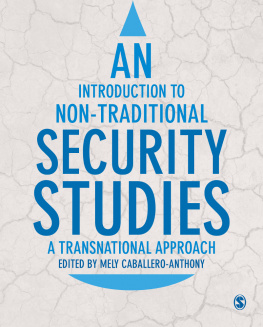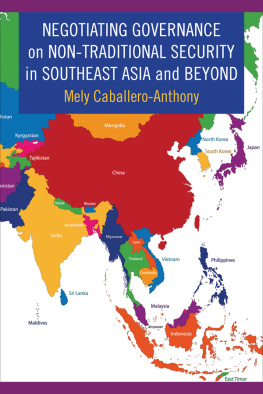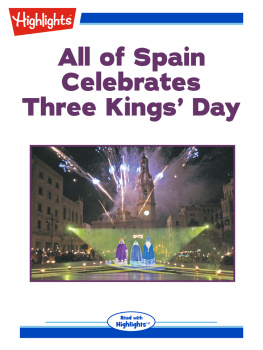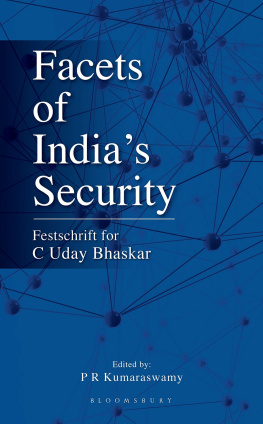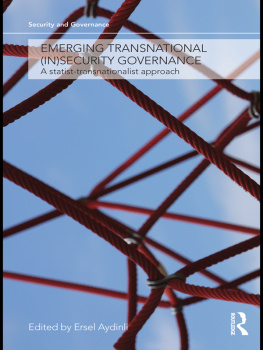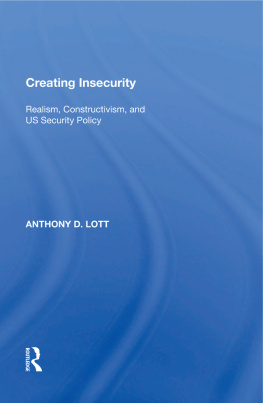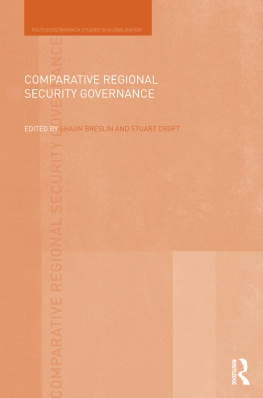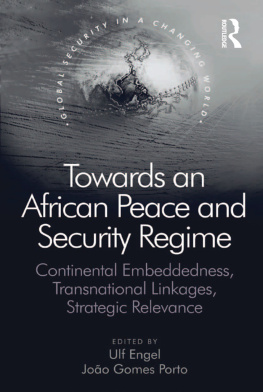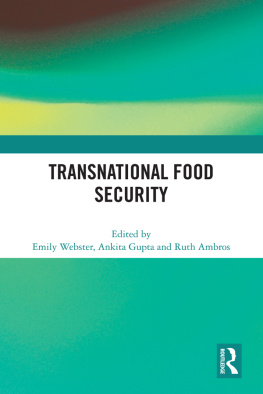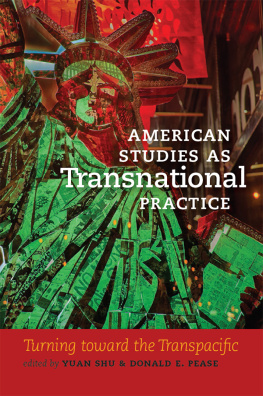SAGE Publications Ltd
1 Olivers Yard
55 City Road
London EC1Y 1SP
SAGE Publications Inc.
2455 Teller Road
Thousand Oaks, California 91320
SAGE Publications India Pvt Ltd
B 1/I 1 Mohan Cooperative Industrial Area
Mathura Road
New Delhi 110 044
SAGE Publications Asia-Pacific Pte Ltd
3 Church Street
#10-04 Samsung Hub
Singapore 049483
Editorial Arrangement and Chapters 1, 2 and 4 Mely Caballero-Anthony 2016
Chapter 3 Alistair D.B. Cook 2016
Chapter 5 Bob S. Hadiwinata 2016
Chapter 6 J. Jackson Ewing 2016
Chapter 7 Paul Teng and Jonatan Lassa 2016
Chapter 8 Daojiong Zha 2016
Chapter 9 Marcus DuBois King 2016
Chapter 10 Simon Rushton 2016
Chapter 11 Melissa Curley 2016
Chapter 12 David Capie 2016
This edition first published 2016
Apart from any fair dealing for the purposes of research or private study, or criticism or review, as permitted under the Copyright, Designs and Patents Act, 1988, this publication may be reproduced, stored or transmitted in any form, or by any means, only with the prior permission in writing of the publishers, or in the case of reprographic reproduction, in accordance with the terms of licences issued by the Copyright Licensing Agency. Enquiries concerning reproduction outside those terms should be sent to the publishers.
Library of Congress Control Number: 2015946630
British Library Cataloguing in Publication data
A catalogue record for this book is available from the British Library
ISBN 978-1-4462-8607-4
ISBN 978-1-4462-8608-1 (pbk)
Editor: Amy Jarrold
Assistant editor: George Knowles
Production editor: Katie Forsythe
Copyeditor: Christine Bitten
Proofreader: Thea Watson
Indexer: Adam Pozner
Marketing manager: Sally Ransom
Cover design:
Typeset by: C&M Digitals (P) Ltd, Chennai, India
Printed in India at Replika Press Pvt Ltd
About the Editor and Contributors
Mely Caballero-Anthonyis Associate Professor and Head of the Centre for Non-Traditional Security (NTS) Studies at the S. Rajaratnam School of International Studies (RSIS), Nanyang Technological University, Singapore. Prof. Anthonys research interests include regionalism and regional security in the Asia-Pacific, multilateral security cooperation, politics and international relations in ASEAN, conflict prevention and management, as well as Human Security. She has published extensively in peer-reviewed journals on a broad range of security issues in the Asia-Pacific. Her latest publications, both single-authored and co-edited, include: Community Security: Human Security at 21, (
Contemporary Politics, 2015) Understanding ASEAN Centrality, (
Pacific Review, 2014), Human Security in ASEAN: 20 Years On, (
Asian Journal of Peacebuilding, 2014),
Non-Traditional Security in Asia: Issues, Challenges and Framework for Action, (ISEAS, 2013). She previously served as the Director of External Relations at the ASEAN Secretariat and currently serves in the UN Secretary-Generals Advisory Board on Disarmament Matters and Security. She is also Secretary-General of the Consortium of Non-Traditional Security Studies in Asia (NTS-Asia) and is a member of the World Economic Forum (WEF) Global Agenda Council on Conflict Prevention. She can be contacted at ISMCAnthony@ntu.edu.sg.David Capieis Associate Professor of International Relations at Victoria University of Wellington, New Zealand. His research focuses on Human Security and humanitarian disarmament in the Asia-Pacific region. He is the author of The Asia-Pacific Security Lexicon (with Paul Evans) which has been published in Japanese, Chinese and Vietnamese editions. He is also the author of
Under the Gun: The Small Arms Challenge in the Pacific (VUP, 2002) and
Small Arms Production and Transfers in Southeast Asia (ANU, 2002). David has been a Visiting Scholar at the Weatherhead Center for International Affairs at Harvard University and the Luiss Guido Carli in Rome and is a Research Associate at the ASEAN Studies Center at American University, Washington DC. David has served as a member of the Public Advisory Committee on Disarmament and Arms Control and is also a member of the ASEAN Regional Forums Expert and Eminent Persons Group. He can be contacted at david.capie@vuw.ac.nz.Alistair D. B. Cookis the Coordinator of the Humanitarian Assistance and Disaster Relief Programme, and a Research Fellow at the Centre for Non-Traditional Security (NTS) Studies, S. Rajaratnam School of International Studies (RSIS), Nanyang Technological University (NTU), Singapore. In 20122013, he was a visiting research fellow at the East Asian Institute of the National University of Singapore. He graduated with a PhD from the University of Melbourne, Australia; Masters from Purdue University, USA; and M.A. (Hons) from St. Andrews University, Scotland. He has taught at Purdue University, University of Melbourne, Deakin University, Nanyang Technological University and Australian National University. His research interests are in non-traditional security and Human Security in the Asia-Pacific including humanitarian assistance and disaster relief, peace and conflict studies, foreign policy and regional cooperation, and domestic politics in Myanmar. He has recently co-edited a book titled
Irregular Migration and Human Security in East Asia (Routledge, 2015) and has published in a variety of journals. He contributes to local and global media outlets. He can be contacted at iscook@ntu.edu.sg.Melissa Curleyis Senior Lecturer in International Relations in the Department of Political Science and International Studies at the University of Queensland Australia, where she is also Director of the UQ Rotary Peace Centre. Prior to taking up her UQ role, she was a researcher in the Centre of Asian Studies at the University of Hong Kong from 19992005. Her research and teaching interests include Southeast Asian politics and International Relations, the politics of migration and security, Cambodian politics, and non-traditional security in East Asia (including trafficking in persons and migrant smuggling, pandemic disease and child protection issues). She is currently working on a book manuscript on Cambodian civil society and democratisation in the post-UNTAC period. Dr. Curley also co-facilitates the UQ Working Group on Human Trafficking and Migrant Smuggling in the T.C Bernie School of Law. She has published across the disciplines of International Relations and Law including in:
Review of International Studies,
Journal of Law and Society,
Australian Journal of Human Rights




